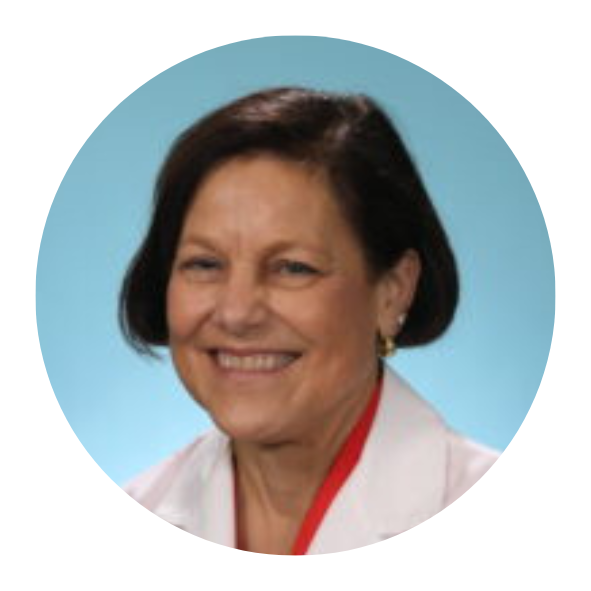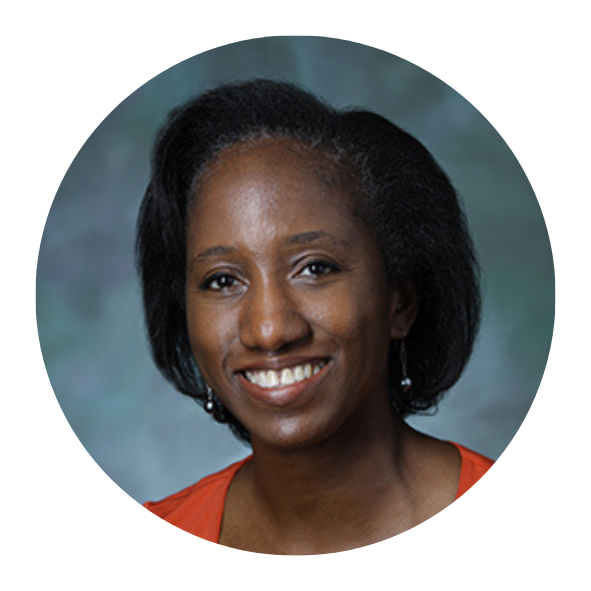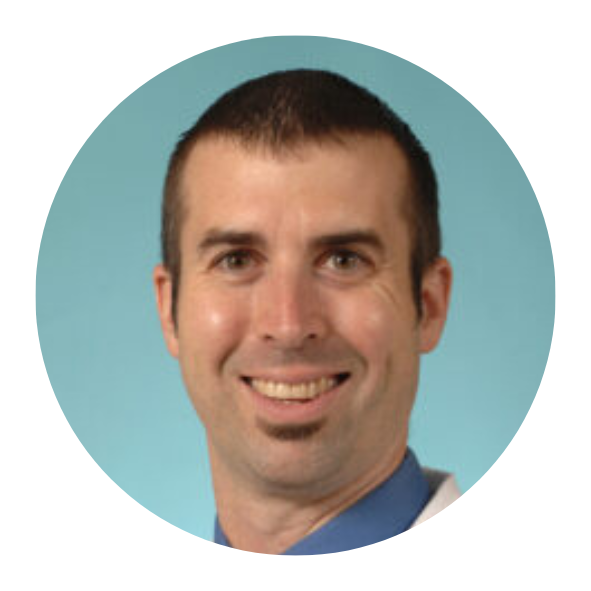Six faculty members from the Department of Anesthesiology have been selected to receive the School of Medicine’s 2024 Dean’s Impact Award: Robert Gereau, PhD, Bernadette Henrichs, PhD, CRNA, Allison Mitchell, MD, Rachel Moquin, EdD, MA, Dolores Njoku, MD, and Brian Wessman, MD.
The Dean’s Impact Awards are given on behalf of the dean of Washington University School of Medicine in St. Louis, David H. Perlmutter, MD, and recognize faculty who have demonstrated enduring commitment to advancing the careers of others through exceptional mentorship and sponsorship of trainees, clinicians, educators, and researchers. These colleagues have not only excelled in their respective roles but have also significantly contributed to advancing the school’s missions.
“We are all immensely proud of the dedication shown by these members of our department to fostering the growth of others,” says Michael S. Avidan, MBBCh, FCASA, head of the Department of Anesthesiology. “Their unwavering commitment to mentorship is inspiring, and their contributions bolster one of the core missions of our institution.”
Congratulations to each awardee for this well-deserved recognition. The following individuals will be honored during a ceremony on Tuesday, April 30, 2024:

Robert Gereau, PhD
Dr. Seymour & Rose T. Brown Professor of Anesthesiology
Director of the Washington University Pain Center
Vice Chair for Research
Robert Gereau, PhD, the Dr. Seymour and Rose T. Brown Professor, director of the Washington University Pain Center, and vice chair for research in the Department of Anesthesiology, has an exceptional history of mentorship over the last two and a half decades. He has supported and trained dozens of young scientists, including more than 20 PhD or MD/PhD students, 25 postdoctoral trainees, three clinical junior faculty developing independent research programs, as well as many medical, undergraduate, and high school students. Gereau genuinely believes that the primary “product” and success of his lab is not the grants he obtains or the publications, but rather the young scientists he helps train and develop as researchers and human beings. He considers mentorship to be his most important responsibility, and this is reflected in everything he does as a PI and as a department leader and institutional citizen.
Gereau’s full-hearted commitment to this mission is demonstrated via the amount of sheer time and energy he dedicates to his trainees. He has one-on-one meetings with every trainee weekly; this time is sacred and does not get displaced. Gereau not only trains junior scientific minds, but he also provides mentorship on career trajectories and character and integrity. He helps position his mentees to successfully reach their goals. For example, his trainees benefit from learning under-appreciated skills such as selecting new lab members; how to interview; how to prepare and manage grant budgets; how to review manuscripts and grants; how to discuss personnel challenges; and how to manage situations and have difficult conversations. Gereau has an unwavering commitment to equity, inclusion, and diversity in all settings. He proactively seeks out the brightest undiscovered talent and ensures that there is a breadth and depth to the voices and perspectives in his lab and in the department. There are too many examples to list of Gereau being a champion of women and individuals from backgrounds underrepresented in science and medicine. One of the most notable is his being one of the founders and the executive director of the Anesthesiology Summer Research (ASSURE) program. ASSURE is an innovative training program launched in 2021 that provides mentored research opportunities for local college students who may not have otherwise had an opportunity to learn at WUSM.
Gereau has been recognized for his exceptional mentorship skills via several awards, including the Outstanding Faculty Mentor Award given by the Washington University Graduate Student Senate in 2011, the Outstanding Faculty Mentor Award given by the WashU Postdoc Society in 2019, and the Landis Award for Outstanding Mentorship awarded by NINDS in 2020.

Bernadette Henrichs, PhD, CRNA, CCRN, CHSE, FAANA, FAAN
Director, CRNA Education and Research
Director, Nurse Anesthesia Program
Professor, Anesthesiology
Bernadette Henrichs, PhD, Professor of Anesthesiology, stands out as an exceptional mentor through her commitment to guiding individuals at various stages of their professional development. Demonstrating a broad and inclusive approach to mentoring, she shares her wealth of experience with ICU nurses aspiring to become Certified Registered Nurse Anesthetists (CRNAs). Driven by a genuine interest in her mentees’ success, she provides valuable advice, counseling, and support, tailoring her guidance to address individual needs.
A notable example highlights her dedication, as she mentored an individual from a disadvantaged background, initially pursuing a career as a certified registered nurse anesthetist. When the mentee expressed a desire to attend medical school, Henrichs wholeheartedly supported this decision, crafting a strong letter of recommendation that ultimately led to acceptance. Her adaptability and encouragement showcase a mentor who prioritizes the professional growth and aspirations of those she guides.
Beyond her role in mentoring prospective CRNAs, Dr. Henrichs extends her mentorship to nurses aspiring to become faculty or program administrators. Her impact is evident in the success stories of individuals like Sarah Perez, Mary Zerlan, Brian Torres, and Vicki Callan, who have flourished under her guidance. Additionally, Henrichs contributes to the research community by mentoring CRNAs pursuing research and PhDs. This is exemplified by the success of mentees like Rob Walsh, Lisa Romkema, and Nick Gabriel.
Her commitment further extends to mentoring CRNAs interested in teaching through simulation, showcasing a comprehensive mentorship approach that spans different career paths within the healthcare field. Henrichs’ dedication to fostering the professional growth of individuals at all levels, from college students to experienced faculty, underscores her outstanding contributions as a mentor.
Henrichs established our training program at Goldfarb School of Nursing for aspiring CRNAs, and thanks in large part to her outstanding mentorship and commitment to learners, this program has been successful over the years in recruiting over 50 graduates of this highly ranked program as CRNAs at Washington University School of Medicine.

Allison Mitchell, MD
Residency Program Director
Assistant Professor, Anesthesiology
Allison Mitchell, MD, Assistant Professor of Anesthesiology, took over as Anesthesiology Residency Director, when the program was in crisis, with deep-seated dissatisfaction among the learners and disengagement among the faculty. Since taking on this role, Mitchell has dedicated herself to transforming the residency, and has been spectacularly successful through her bold innovations and staunch personal commitment to each and every resident in the program.
Specifically, Mitchell has had a positive impact on creating a welcoming climate and collaborative culture; on improving the formal didactics of the residency; on re-engaging the faculty in their educational mission; and on ensuring that the residents have sufficient structured time for education and professional development.
In her role as the residency program director, Mitchell touches the careers of current and future anesthesiologists at all levels. She is the face of clinical training for the approximately 80 residents in the department. She introduces them to the hospital at the start of their training; meets with each of them individually throughout their training; responds to each of their individual needs throughout four years. At the end of residency, hers is the final hand that each new anesthesiologist shakes. She is primary professional mentor to a new group of anesthesiologists each year.
Mitchell’s role as a mentor, however, spreads both forward and backward from the residency program. To one side, her role in training is not lost on medical students—both from Washington University School of Medicine (WUSM), and those from other medical schools visiting the department. She participates in multispecialty panels; she works with students in the OR; she provides career advice (and often letters!) to many students each year, as they make their choice of specialty.
Beyond trainees, Mitchell’s job at the center of a large training program places her in the role of mentor to many faculty and staff who support the residency. The department’s residency program currently has four assistant program directors, and several other faculty members in different roles, who report to her. All four look toward education as the center of their careers as academic physicians, and all receive guidance from her.
In addition to her vitally important mentorship roles at WUSM, Mitchell has also made national mentorship contributions as a founding leader of Raising Anesthesiology Diversity and Anti-Racism (RADAR), which aims to ensure that learners from diverse backgrounds are encouraged to pursue Anesthesiology as a specialty, and to promote inclusivity in academic anesthesiology training programs across the country.

Rachel Moquin, EdD, MA
Associate Vice-Chair for Faculty and Educator Development
Assistant Professor, Anesthesiology
Rachel Moquin, EdD, MA, has made significant contributions as a mentor in the Department of Anesthesiology, focusing on various initiatives to enhance clinical education. One major accomplishment is the development of a year-long education leadership program aimed at early-career clinician educators. This program, attended by 14 faculty, seven fellows, and three resident participants, involves teaching six modules and mentoring individuals for six months on their chosen educational goals. Impressively, five faculty participants have advanced to departmental leadership positions in education since completing the program.
Furthermore, Moquin created a novel clinical educator elective track for CA3 residents, serving as the elective rotation director and mentor. The goals of this elective track include providing robust training in educational areas to support resident growth as clinical educators and exposing residents to various opportunities within medical education for future career considerations.
In addition to her work within the Department of Anesthesiology, Moquin has been actively involved in mentoring programs at Washington University School of Medicine (WUSM). She has facilitated sessions for the Methods in Education Scholarship Courses and mentored participants pursuing educational scholarship projects. As a mentor in the Teaching Scholars Program, WashU Teaching Physician Pathway Program, Foundations in Teaching Skills Program, and Academy of Educators Mentoring Committee, Moquin has consistently demonstrated her commitment to supporting faculty, residents, and fellows in curriculum development, educational projects, and teaching skills.
Her leadership in various mentoring roles contributes significantly to the educational and professional development of individuals within the department and the broader WUSM community. Moquin is currently providing mentorship to 15 faculty members, 11 residents and fellows, two medical students, two certified registered nurse anesthetists, and one staff member.

Dolores Njoku, MD
Vice Chair, Anesthesiology
Division Chief, Pediatric Anesthesiology
Anesthesiologist-in-Chief at St. Louis Children’s Hospital
Professor, Anesthesiology
Dolores Njoku, MD, Division Chief of Pediatric Anesthesiology, stands out as an exceptional mentor and sponsor, demonstrating a keen commitment to the professional development of her colleagues. In her role, she implemented a strategic approach to mentorship, organizing teams that focused on specific areas of expertise and conducting monthly meetings to set SMART goals.
Through her leadership, the Clinical Operations group, Pediatric Anesthesiology Research Accelerator Development (PARADE), and Pediatric Anesthesiology Education Partnership were re-organized, leading to the promotion of two faculty to full professor, four to Associate Professor, and three to Assistant Professor.
Njoku’s impact extends across various domains of mentorship. In the realm of Clinical Mentorship, she effectively facilitated the promotion of faculty to professor by establishing commitments to safety in clinical operations. Monthly meetings with the director of Pediatric Cardiac Anesthesia resulted in strategic goals, hiring new faculty, and integrating pediatric CRNAs into the team.
Education mentorship thrived through PARADE and education partnerships, with Njoku tailoring individual development packages for faculty promotions. In the research mentorship arena, her guidance was instrumental in the successful transition of fellows to faculty, exemplified by her support for mentees like Brandon Tan and Ben Sanofsky, resulting in achievements such as Deans Scholar positions and project funding.
Njoku’s multifaceted approach to mentorship underscores her dedication to fostering growth, not only in clinical and educational realms but also in the research domain, making her an outstanding leader in Pediatric Anesthesiology, and beyond.

Brian Wessman, MD, FACEP, FCCM
Professor, Anesthesiology & Emergency Medicine
Director, Anesthesiology Critical Care Medicine Fellowship
Brian Wessman, MD, stands out as an exceptional mentor and sponsor, leaving a lasting impact on those he guides. Described as a pillar of inspiration, he has played a crucial role in the professional journeys of his mentees.
With over 15 years of involvement in post-graduate education and mentorship, Wessman has significantly contributed to the Critical Care Medicine-Anesthesiology Fellowship at Washington University. Under his guidance, the fellowship has grown to accommodate 10 annual first-year training spots and additional second-year EM/CCM Fellows, making it a nationally recognized program.
Wessman’s mentorship extends beyond fellowship, influencing diverse career pathways, including palliative care medicine, community emergency medicine, and research. His commitment to mentorship is evident in the success of his mentees, with one recently honored with a Rising Star award.
A former resident, CCM Fellow, and now faculty colleague expressed profound gratitude, acknowledging Wessman’s role as an awesome program director, an amazing mentor, and a steadfast friend. Another mentee, a CCM Fellow, emphasized Wessman’s phenomenal leadership, noting his loyalty, support, and proactive approach. This fellow expressed a willingness to follow Dr. Wessman to another institution, a testament to the trust and admiration cultivated under his mentorship.
The testimonials from his many mentees underscore Wessman’s influence, with expressions of gratitude for his dedication, support, and passion for critical care. Sentiments expressed by graduating critical care fellows over the years highlight the personal and professional growth facilitated by his mentorship, making Wessman an outstanding and highly regarded figure in the field.
Furthermore, his impact on program growth is evident through his role as the only EM/CCM Program Director approved by the American Board of Anesthesiology in the country, actively contributing to the development of multidisciplinary fellowship training nationally and locally. His dedication to education is reflected in the growth of ACCM Fellowship programs that accept EM trainees, impacting hundreds of subsequent EM/CCM trainees.
It is also important to emphasize that, as well as dedicating himself to critical care fellows, Wessman is a mentor and sponsor to many medical students, residents, ICU nurses, and ICU nurse practitioners. He is truly everybody’s champion.
